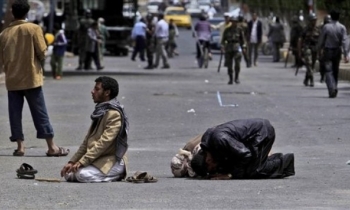Leading Egyptian newspaper editor Ibrahim Eissa has been sentenced to six months in prison for "reporting" on President Hosni Mubarak's health problems. Eissa, editor of Al-Dustour, will post the 200 Egyptian pounds bail (US$40, €25) to avoid serving his sentence while he appeals.
"The state has been put at risk," Judge Sherif Kamel Mustafa said in a Cairo court, while reading out the verdict details. "He reported false news about the president health which he knew were fabricated." The judge said that the Eissa articles threatened the economy. "Investors withdrew their investment from the country and the stock market collapsed, costing the economy some US$350 million (€225 million)," he said.
"This verdict is against all international human rights conventions," Eissa told Agence France-Presse (AFP) after the judge handed down the sentence in a Cairo court. He said the verdict showed the regime's hostility towards the press and "affirms the holiness of President Mubarak (79) and the rejection of any criticism of him or his policies. I don't know if this is a judicial decision or a political one."
The case, according to the Associated Press (AP), stemmed from Eissa's publiction of stories in August speculating on Mubarak's failing health. The stories, including one saying the president had lapsed into a coma, ran for several days. Mubarak and state-run media did not comment on the rumours for weeks until the president appeared in photos and gave an interview to state-run media. Days later, first lady Suzanne Mubarak said in a rare television appearance that her husband was healthy and journalists who reported otherwise deserved to be punished.
Mubarak, who has ruled Egypt for more than a quarter century, has no designated successor. But many say his son Gamal is being groomed for power, a prospect that has sparked widespread opposition.
"The regime is trying to defend itself because it knows it has plunged the country into successive crises and, if my imprisonment will make bread reach the people who are queuing for it, then I am ready to go to prison," Eissa told AFP. The journalist was referring to rampant inflation that has seen the price of many food staples, including bread, skyrocket in recent months.
Makram Mohammed Ahmed, the head of Egypt's Press Syndicate known for his ties to the government, noted that the whole process was still in its early stages. "This is not final and I expect it won't be implemented," Ahmed told AP, predicting that before it went to the higher court, the ruling National Democratic party and the editor would reach a compromise.
"We hope that with dialogue we can overcome these court cases," Ahmed said by phone from Damascus, referring to ongoing negotiations between the government's Supreme Press Council and newspaper editors over proposed new code of ethics for journalists which would discourage criticism of the president or his family in return for an end to government-instigated libel law suits
The 41-year-old Eissa, the AP report mentioned, was earlier sentenced to a year in prison along with three other newspaper editors in a separate case in September for defaming Mubarak and his party. Al-Dustour is sharply critical of the government and often breaks political, social and religious taboos in its articles. The paper was closed down in 1998 for seven years by the government after it published a statement by an Islamist group threatening Coptic Christian businessmen in Egypt. It reappeared on the newsstands in 2005. The next year, Eissa was against sentenced to a year in prison for libeling Mubarak. An appeals court later reduced the sentence to a US$4,000 (€2,570) fine.









